Hi Anick-Marie! You’re a very experienced nomad by the looks of things! Tell us a little bit about who you are, where you come from and what you do.
Hey hi! I’ve been a nomad for almost 13 years, albeit a very slow one. I hold a Canadian passport. I survive financially by working as a travel writer and lecturer. I am very frugal, so I don’t need much, and I spend most of my time volunteering on various projects.
Did you have a life before the nomadic one? What did you do and what made you decide to start living the way you do?
I grew up in a tiny set of islands off the East Coast called the Magdalen Islands. My family is Acadian and we spoke French at home. We moved near Ottawa when I was eight, and then I left home in a turmoil when I was sixteen. Back in those days, I had barely dreamt of travelling. All I was doing was surviving.
I chose to go to college to get at least one degree to rely on, to move on from surviving to living. When I got that degree, I started thinking: “Oh, now I have something to fall back on. I could travel just for one Summer before I start working.”
Someone managed to convince me to go to university instead, which wasn’t on my plans, but I had the grades and got a grant to study in France for my second year.
This was a revelation.
There was so much in the world that I didn’t know about, that I could barely understand, and I was only in the country whose culture was told to be the closest to mine. It was dizzying.
When I got back, I quit my Biophysics studies and started to learn more in the fields of Humanities, Social Sciences, etc.
There was no going back to normal now, and I was postponing “getting a real job” with international volunteering projects. I guess the projects became less and less official, less secure, less institutionalized, and I have since then learned to be my own center of gravity, without a job or a formal career path.
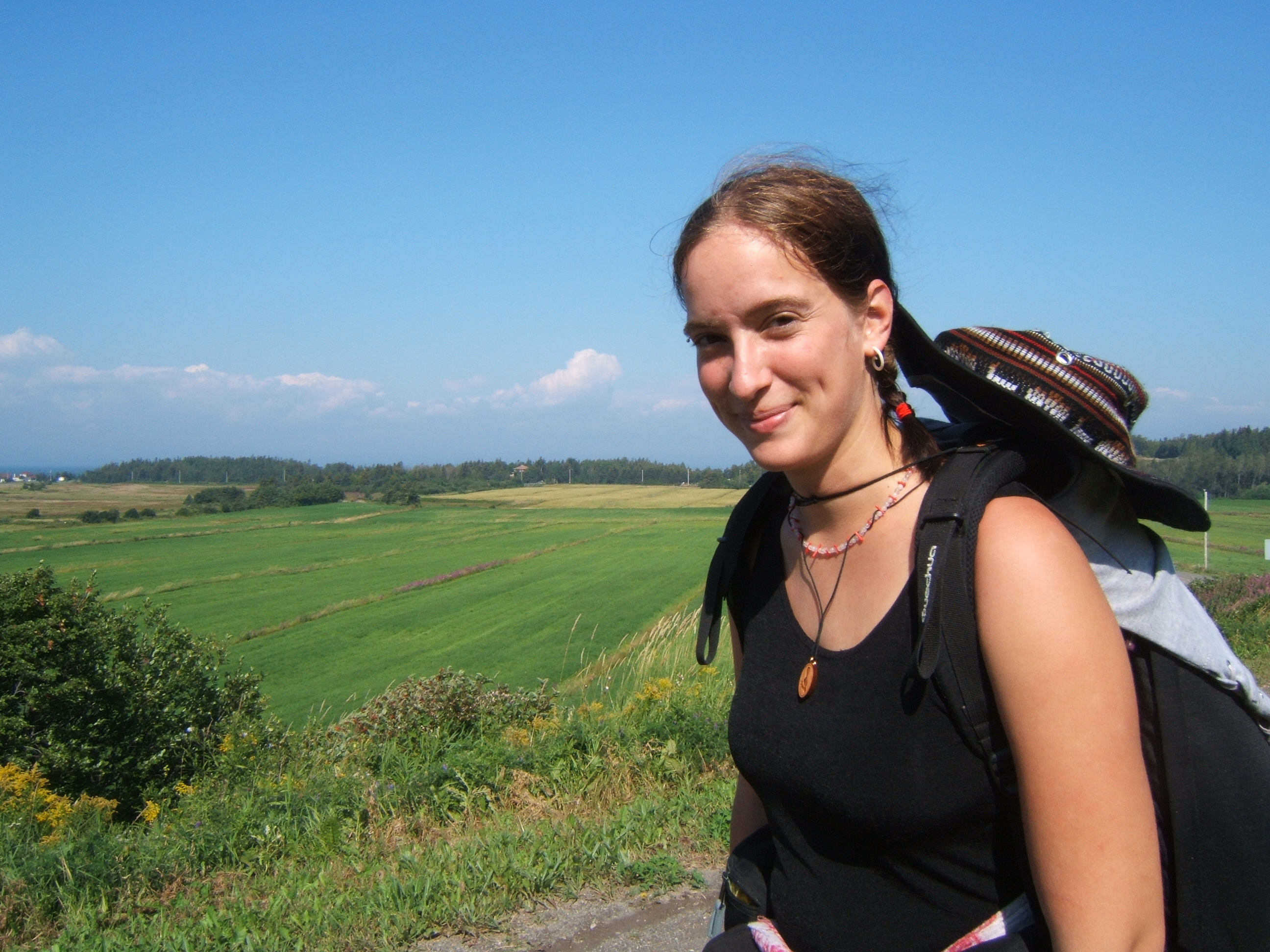
Where have your travels taken you over the years?
I have mostly roamed around Europe, with the exception of the Baltic States and an under-representation of the Balkans. I feel like Western Europe is my main playground and that my sandbox sometimes overflows. *laughs*
In 2013, I cycled across Eurasia on a solar bike, from France to Kazakhstan, via the Balkans, Turkey and Western Caucasus. I came back to France hitchhiking from Kiev. My best friend lives in Norway, I try to go there once a year, if I can. I also hitched to New York once, my only trip in the USA!
I’ve lived (meaning stayed over a month in a row) in Scotland (Edinburgh), in Germany (Berlin, Cologne and Bremen), in France (Montpellier, Paris, Picardy, Lot-et-Garonne, Savoy), in Belgium (Bruges), in the Netherlands (Groningen) and in Turkey (Istanbul). I’ve also lived in Peru (Ayacucho) and in different cities in Canada (Montreal, Trois-Rivières, Rimouski and Iqaluit, in the Arctic archipelago). I’m going back to Turkey for the Summer, setting a base in Antalya.
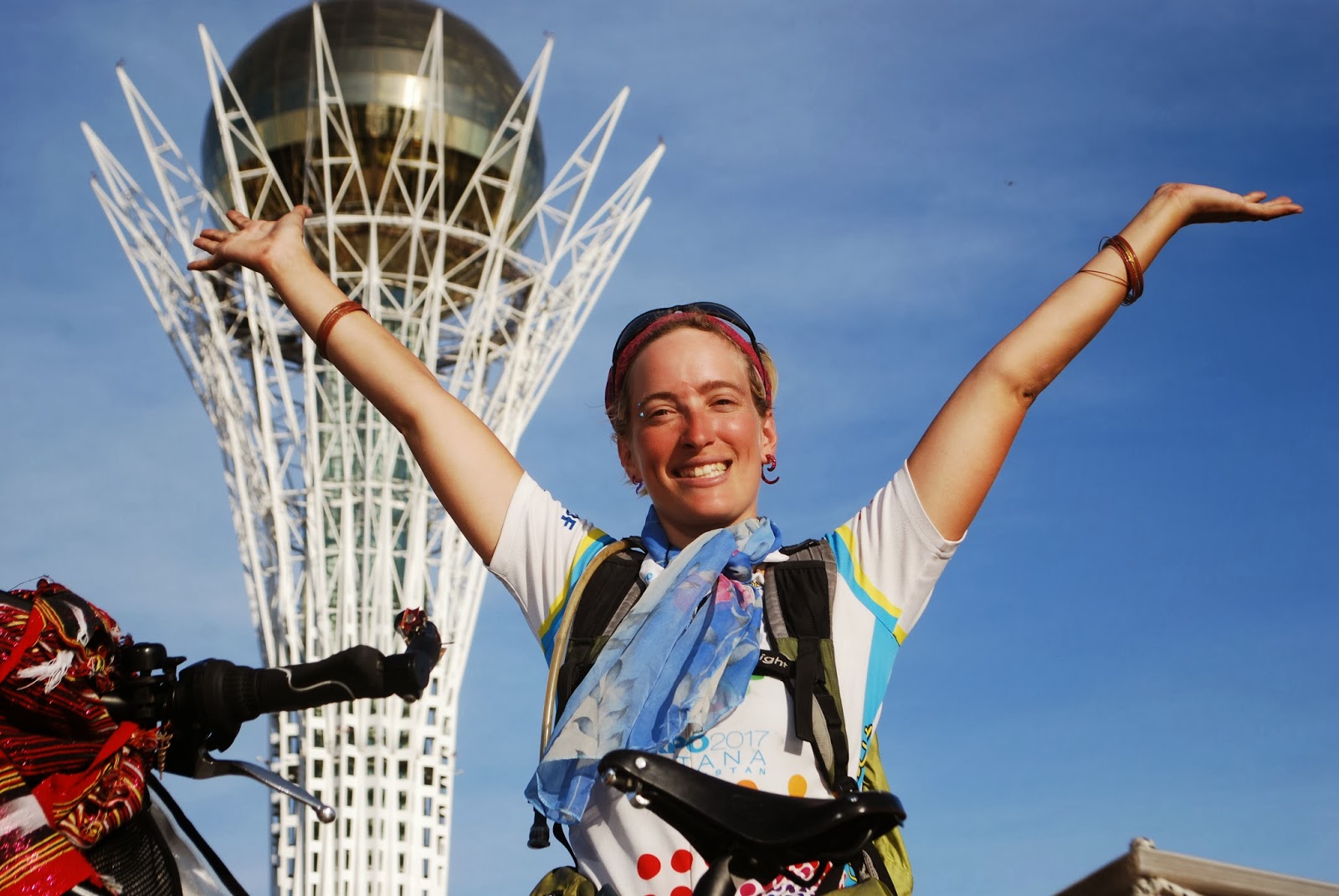
Do you mainly travel alone or have you travelled with other people in the past?
I prefer to travel solo. I know it’s more risky, especially as a woman hitchhiking, but I am not particularly afraid… I try to remain lucid and chose the risks that I take. I don’t do extreme sports, so maybe there are different levels of risks that I find myself ready to get exposed to.
Sometimes people ask me to take them with me hitchhiking, as a way to gain experience or to spend time with me. I’m always a little bit anxious when it comes to having other people with me because I feel a greater sense of responsibility. I want them to enjoy their experience so bad that it makes me nervous!
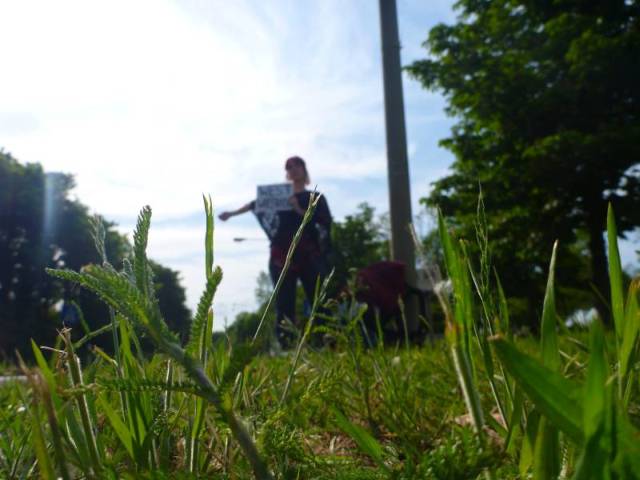
You choose to travel mainly by hitchhiking. Why in this way? What do you get from it that you wouldn’t get from other methods of travel?
Oh dear, I feel like there are a lot of reasons why I would want to hitchhike!
It’s frugal, it’s optimizing empty seats in a world where cars are mostly riding half-empty, it’s bringing company to the lonely riders, openness and perspective to someone who might just need it, it’s an opportunity to practice a foreign language, to get out of your comfort zone, to live an adventure, to challenge your own adaptability…
I like the part of randomness that forces to trust not only your skill in finding the right hitchhiking spots but also the generosity of people that could be offering you a ride. It’s a learning process on how to cope with your lonely self when you have to wait, when you are the sole responsible for the decisions you make. Hitchhiking taught me a peaceful outlook at life and a mental sanity.
You cope with yourself. You’re there for others. It’s humbling and yet so powerful to experience.
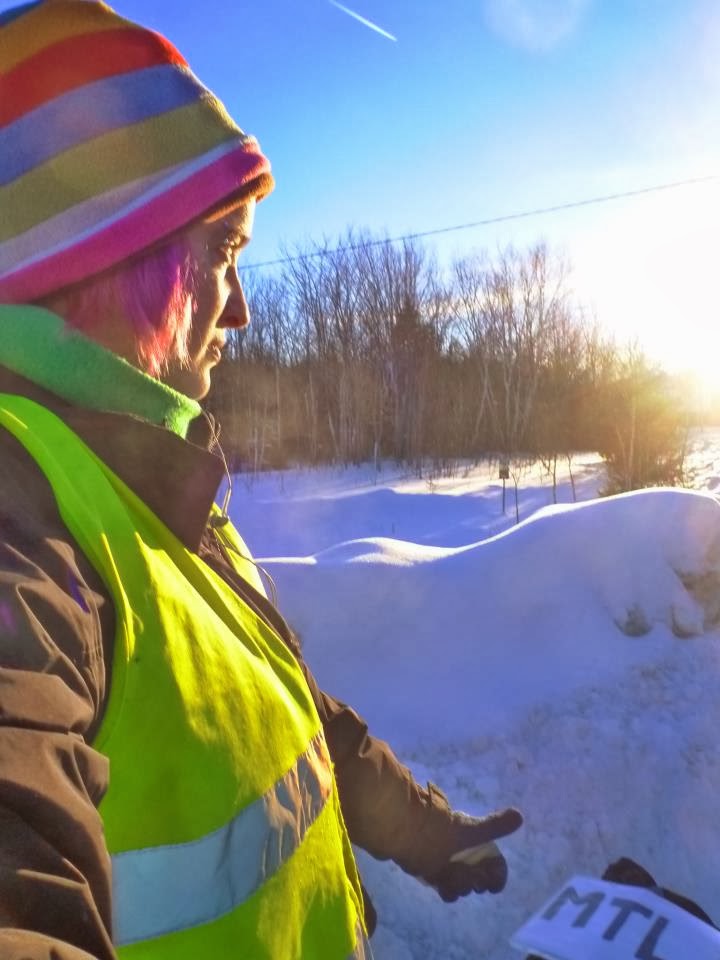
What other methods of travel have you tried?
I have walked, cycled, rideshared, train-hitchhiked (different from freighthopping in that you negotiate permission) and used the usual buses, trains and planes.
I wish to boat-hitch and sail on a cargo boat at some point.
Have you run into any difficulties as a solo female travelling in this way? I know many females who wouldn’t dream of travelling in this way because of the perceived risks. What would you say to them?
Well, perceived risks often come from very real sources of danger. I’m not the hippie one that tells people to embrace life and that all will go well and people are so amazing and nothing will ever happen to you. Most of us women are aware that we are generally more at risk of sexual assault than men, whether we are at home or on the road, it’s something we live with every frigging day of our lives. And call me Captain Obvious, but some situations are riskier than others: rock climbing without proper gear, BASE jumping, solo hitchhiking after dark…
What do you wanna do? Lock yourself up in a house so you can live as long as possible? What if you develop cancer way before you get old?
We are facing risks on a daily basis and we are intelligent beings: we can get information about those risks and chose wisely for ourselves. I believe this is just as true for women as it is for men, only women naturally face more victim blaming when they chose to take a risk, especially a human risk. That can be deterrent… More so than the risk itself!
To be frank, sometimes I just can’t believe how much risk people are taking without even realizing it. And then they are quick to judge my own risk-taking! I don’t go to bars, I avoid drinking when traveling. I stay with locals. I live with little money and second hand clothes. I have seen so many different ways of getting in trouble while volunteering some years for CouchSurfing on their Member Disputes and Safety Team… Alcohol and parties are big deals!
What’s the riskiest situation you have found yourself in while travelling?
Answering all sorts of questions with superlatives are fairly risky… *grin* I usually tell the story of my kidnapping, as it sounds so… spectacular! It was not. It felt more like I had made some mistakes I could learn from, and hopefully I did. I react so much faster now to human sources of danger… I prefer to face being stranded than to be around someone with bad intentions.
I’m always aware that something can happen, just as when you are driving you’re ready to react to something unexpected. I don’t want to become paranoid, but I am lucid. I am taking risks, I have to be clever to avoid danger at times.
I have since had to get out of cars/trucks three times, sometimes getting out in the middle of nowhere. I got trapped at night at La Jonquera after escaping a driver at a rest area 3 km away from the gas station, asked my way by night at a stripper club and got booted out of the highway tollbooths only to take a bus out of that place after spending hours outside in the wintertime. Shitty day. C’est la vie.
I believe I may have exposed to more risks during my cycling trip, though. I have seen road accidents and dead bodies. The road can be harsh. Cycling 8,200 km and hitchhiking over 140,000 km, I can now say that I don’t believe bad people to be the main source of danger when travelling.
Are there any services that you use to help you out on your travels? What is your favourite?
I use to work for CouchSurfing, the hospitality website and I have used it for 8 years, but they recently seemed to have focussed on breaking down the community aspects of the website and it lost its advantage on other similar sites. I know recommend using Trustroots for hospitality when hitchhiking and Warmshowers when cycling. BeWelcome is also a good place to start with Hospex (Hospitality Exchange).
I use various wikis when moving – Hitchwiki and its maps, sometimes Wikivoyage and Nomadwiki or Trashwiki for dumpster diving. These are all community-driven websites, some of them really thriving.
Tell us a bit more about your book for Lonely Planet? I’m sure a lot of people reading would be really interested to know how you secured such a good deal.
At the end of 2009, I received an email from a member of the Hitchhiking group on Couchsurfing, suggesting we write a book together. I thought they were more organized than me and I was also planning on writing a book about hitchhiking so I hopped on their project and contributed a chapter.
In the end, we wrote a whole alternative travel handbook together featuring very practical chapters on hitchhiking, stealth camping, foraging, plane hitchhiking, travel health and safety and intercultural communication, to name only a few.
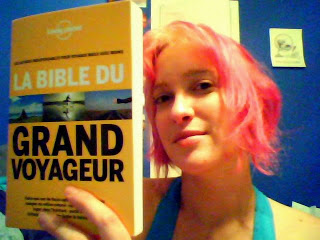
We honestly thought that nobody would want to publish such a non-mainstream book and that we would need to self-publish. I started to blog because nobody knew me in the French travelling community. I was only known with the Euro-nomads, for my work on Couchsurfing’s safety and my lectures on Female Solo Travel.
We were surprised when Lonely Planet got interested, but we presented them with a high-quality project near completion. They had very little rework done on the book, maybe 5% of the contents was modified. It pays to aim high and work hard. It took three years of work to end up holding the first edition into my hands. Sadly, it’s not available in English, only in French and Spanish. We still dream of having it adapted in English, if you know a good agent, let us know!
After publishing “La Bible du grand voyageur”, they asked me if I wanted to become a freelance author on other projects, and I worked on two other books since.
If I asked you for some of your major tips for catching a ride when hitchhiking, what would they be?
- Think safety first! Imagine if you were a driver seeing you there and trying to stop to pick you up. If they can’t be safe doing so, how can you be?
- Try to think in terms of direction, not of destination. You will probably not catch a direct ride, but hop with a few different people
- Smile! It’s sociologically proven to encourage drivers to want to help you. Nobody wants a desperate person with a bad attitude in their car. Be respectful and aware or your drivers’ needs.
- Start early. Daylight is your friend, and many people are riding solo because or their work early on weekdays, which makes it faster and safer to get a ride.
Care to share one of your most memorable moments from your travels?
Once upon a time…
I was in Kazakhstan near Ordzhonikidze, exhausted from riding my solar bike under the windy rain. I wanted to find a hostel in the nearby town but decided to pass after two drunken policemen tried to forcibly escort me “in order to protect me”…
So I kept on riding towards Lisakovsk and I saw this village I had spotted on Wikimapia called Pereleski. I was an early geek, and my nickname on BBSs and IRC and generally Internet used to be “perilisk”, a name derived from Final Fantasy I. I immediately felt attracted to the place. The village was a bit away from the road, so I just stopped at the bus stop near the village sign and took a moment to rest and meditate.
A man dressed in black came on a carriage with two horses. He was there to pick up his two nieces coming back from the city hitchhiking. Like many, he got curious about my solar bike. I was almost out of power, but that, I didn’t say. He asked me to wait a bit. When the girls came back, he told me I should come to his sister’s place with the girls. This was Kazakh hospitality at it’s best.
The family was incredibly welcoming, and he was the only man under the roof. They fed me and offered me a room and a bed for the night. He was breeding horses and so he made me spend some time with them, as a way to spend some time with me. I tried to keep a polite distance. As they had no bathroom, they took me to one of the village’s sauna. I was really well cared for. I went to bed and fell asleep immediately.
A light flashing in my face woke me up – he was watching me sleep with his Smartphone and this woke me up and freaked me out. I almost shouted and he was confused and sorry and sweet but I was panicked and breathing very loud from the adrenaline rush. He calmed me down and asked if he could join me in bed. It was a big no. If he’d done anything, I would have shouted and his mom and sister and nieces… everybody would have seen him humiliated. He asked again, I said no again and he left me alone for the night.
The following day, he was avoiding me a bit. I took a long breakfast with the family, and he came at the last moment, putting a saddle on his favorite horse. He left me his address – it took him several minutes to write it down. He followed me until the main road, riding proudly on his horse, and I thought he looked beautiful and brave, all dressed in black again.
He insisted to buy me my favorite dish at the restaurant there, while he smoked some cigarettes, then bought me chocolate and fruit juice for the road. At the last moment, before we both got back on our saddles, he grabbed my hands and kissed them, saying “Ya tibia … I love you.”
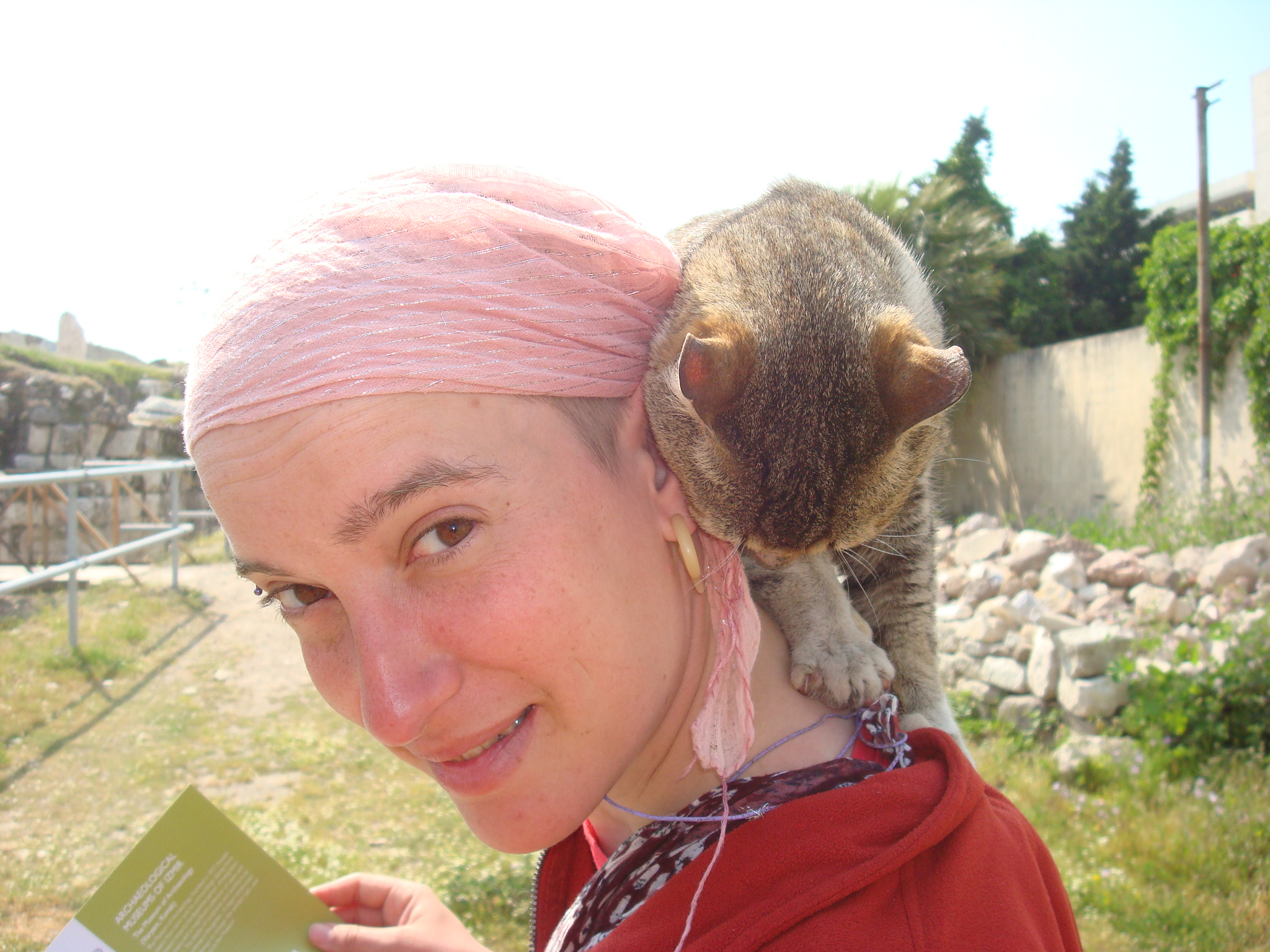
Which country would you recommend most?
Personally, I am such a huge fan of Turkey that it is hard for me to think of another place, but I wouldn’t recommend it to the beginner solo female hitchhiker, for example. For that, I would recommend hitchhiking in Sweden, where a lot of women drive and pick up female hitchhikers…
I don’t feel I have a real legitimacy to recommend a country. People can discover amazing things and learn about themselves less than a hundred miles away from their home. It’s all about pushing your own boundaries and getting into “Explorer” mode, this mindset where you talk to random people, where you ask questions, where you try new things.
If I can recommend anything, it would be to try learning the local language before going there. To be able to speak a few words allow you to break the ice, appear interested and friendly and gets you invited more easily 😉
What do you think are some of the main difficulties with living the way you do?
Managing my finances is a recurrent source of stress. I wish I could earn €100 000 in some way, this would get me going for ten years without worrying, allow me to be more generous with my friends and acquaintances and to focus on my meaningful volunteer work…
A closely related topic is health insurance. I am not always covered, which puts me at risk. According to Canadian laws, I have to manage my time in and out my “province of residence” to be covered when I know I need to be. If I’d earn a more regular income, this would be something I would be gladly putting more money in.
Finally, as I travel generally slowly, I have issues with residence and visas. I wish I could stay longer in the Schengen area without having to leave (I need to be out for 3 months if I’m in for 3 months). My life is mostly based in Europe, so that is something I must deal with constantly. It was also an issue for Russia where you have to request a visa from your country of residence. Just thinking about visas for Central Asia gives me headaches…
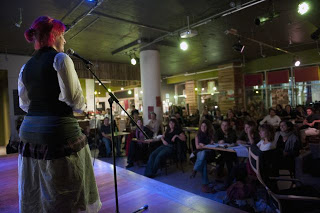
What have the last 12 years of travel taught you about yourself and the world?
We are ignorant and oblivious of other people’s realities. We live in boxes that have their own inner logic and it can become very hard sometimes to land into a different box and interpret its reality.
Maybe you know about the “Iceberg of Culture” allegory? What we see is just the tip of the iceberg, the actions, the clothing, the language, the arts… Beyond what you see, there’s a much bigger chunk to learn about: myths, beliefs, cosmology, emotions, relations… And only when you start understanding what is under can you untangle what’s happening at the surface.
When people ask me to explain thing to them such as the differences between Europe and North America, Quebec’s nationalism or how the Inuit live their lives, my answer tends to be: it’s complex. How much time do you have? I cringe at people saying strong statements about other cultures, making harsh judgments. We must remain humble and listen, make links and genuinely try to understand.
Where’s the next adventure?
Right outside the door! Leaving Savoy for Milan, then hitchhiking to Turkey and staying there for three months, working for the solar bike rally The Sun Trip. When I can come back in the Schengen Area, I’m going to Berlin and will visit my best friend in Norway. I’ll be highly mobile on my European territory for 3 months, then going back to Quebec to work on a guidebook. I feel an urge to be writing a lot, books, blog, essays.
Oh, my next REAL adventure? I’m not sure. Discovering Maghreb? Hitchhiking to Senegal? Or roaming around South-East Asia? We’ll see that in a few months… 😉






Laisser un commentaire